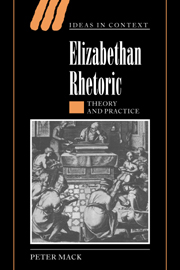Book contents
- Frontmatter
- Contents
- Acknowledgements
- Introduction
- 1 Rhetoric in the grammar school
- 2 Rhetoric and dialectic at Oxford and Cambridge
- 3 English-language manuals of rhetoric and dialectic
- 4 Everyday writing: notebooks, letters, narratives
- 5 Histories, conduct manuals, romances
- 6 Political argument
- 7 Elizabethan parliamentary oratory
- 8 Religious discourse
- Conclusion
- Bibliography
- Index of rhetorical and dialectical terms
- General index
- IDEAS IN CONTEXT
Conclusion
Published online by Cambridge University Press: 22 September 2009
- Frontmatter
- Contents
- Acknowledgements
- Introduction
- 1 Rhetoric in the grammar school
- 2 Rhetoric and dialectic at Oxford and Cambridge
- 3 English-language manuals of rhetoric and dialectic
- 4 Everyday writing: notebooks, letters, narratives
- 5 Histories, conduct manuals, romances
- 6 Political argument
- 7 Elizabethan parliamentary oratory
- 8 Religious discourse
- Conclusion
- Bibliography
- Index of rhetorical and dialectical terms
- General index
- IDEAS IN CONTEXT
Summary
In 1605 Francis Bacon identified an excessive concern with words as one of the enemies of learning. In Bacon's reconstruction, Martin Luther, finding that no theologians in his own time would support his reforms, was forced to look to ancient authors for assistance.
This by consequence did draw on a necessity of a more exquisite travail in the languages original, wherein those writers did write, for the better understanding of those authors and the better advantage of pressing and applying their words. And thereof grew again great delight in their manner of style and phrase and an admiration of that kind of writing.
The need to consult original texts led to investigations of language and delight in ancient expression. This enthusiasm for pure Latin was increased by hatred of the scholastics and their technical neologisms, and by the need to preach effectively to ordinary people.
So that these four causes concurring, the admiration of ancient authors, the hate of the schoolmen, the exact study of languages, and the efficacy of preaching, did bring in an affectionate study of eloquence and copie of speech, which then began to flourish. This grew speedily to an excess; for men began to hunt more after words than matter; and more after the choiceness of the phrase, and the round and clean composition of the sentence, and the sweet falling of the clauses, and the varying and illustration of their works with tropes and figures than after the weight of matter, worth of subject, soundness of argument, life of invention or depth of judgement.
- Type
- Chapter
- Information
- Elizabethan RhetoricTheory and Practice, pp. 293 - 304Publisher: Cambridge University PressPrint publication year: 2002



